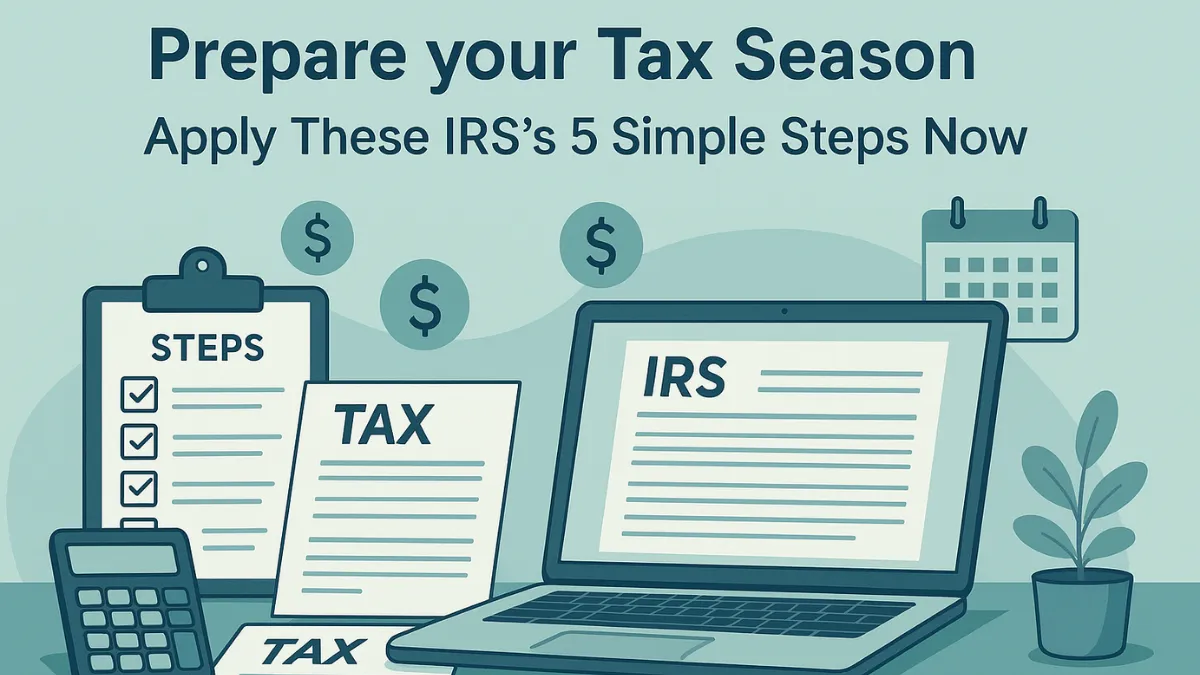Get Ready for Tax Season: A Simple Guide
April might feel far away, but when it comes to taxes, it’s smart to start early. Being prepared ahead of time can lower your stress, help you avoid mistakes, and might even save you money!
The IRS handles millions of tax returns each year. If you plan ahead, you can file your taxes correctly and on time without rushing.
Let’s break down five easy steps to help you get ready for tax season.
Step 1: Collect and Organize Your Tax Documents
Start by gathering all the papers you’ll need for filing taxes. These usually start arriving in January.
Here are some common documents you should look for:
- W-2 forms from jobs
- 1099 forms if you’re self-employed or have other income
- Interest statements from banks
- Mortgage and student loan interest forms
- Records of charitable donations
- Medical expense receipts
- Last year’s tax return
Tip: Create a folder (digital or physical) to keep everything in one place. Organizing by category—like income, deductions, and investments—makes filing easier.
Step 2: Know About Deductions and Credits
Deductions and credits help lower your tax bill, but they work differently:
- Deductions reduce the income you’re taxed on.
- Credits directly lower the amount of tax you owe.
Here are a few common deductions:
- Standard deduction (set amount based on your filing status)
- Mortgage interest
- State and local taxes
- Student loan interest
- Retirement contributions
And some useful tax credits:
- Earned Income Tax Credit (EITC)
- Child Tax Credit
- Education credits like the American Opportunity and Lifetime Learning Credits
- Childcare Credit
Visit the IRS website or speak to a tax professional to see what you qualify for. You could end up with a bigger refund!
Step 3: Choose the Right Filing Status and Method
Your filing status affects your tax rate and what credits or deductions you can claim. Common options include:
- Single
- Married filing jointly or separately
- Head of household
- Qualifying widow(er)
Once you know your status, decide how you want to file:
- Do it yourself online (Free File options if you earn under $73,000)
- Use tax software like TurboTax or H&R Block
- Hire a professional
- Use free help through IRS Volunteer Income Tax Assistance (VITA) programs
Choose the method that fits your situation and comfort level.
Step 4: Use Smart Tax Strategies Before the Year Ends
Some tax-saving actions need to be done before December 31st. These might help lower your taxes:
- Max out contributions to retirement accounts (like 401(k) or IRA)
- Make charitable donations
- Pay certain expenses early
- Delay income until next year
- Sell losing investments to offset gains
If you’re self-employed, consider making retirement contributions or buying needed equipment before the year ends.
Planning ahead can make a big difference!
Step 5: File Your Taxes and Plan for Any Refund or Payment
The IRS starts accepting tax returns in late January. Filing early helps you get your refund faster—especially if you use direct deposit.
If you owe taxes, you can pay by:
- Direct bank payment
- Credit/debit card (fees apply)
- Payment plans
- Electronic Federal Tax Payment System (EFTPS)
Pro tip: If you usually get a big refund, consider adjusting your paycheck withholding so you keep more money during the year instead of waiting for a refund.
If you owe a lot each year, adjusting your withholding can help avoid surprise bills or penalties.
FAQs
Q1: When is the tax filing deadline?
A: It’s usually April 15, but it can shift slightly depending on weekends or holidays.
Q2: What if I don’t have all my documents yet?
A: Contact the company or bank that should have sent them. Many documents are also available online.
Q3: Do I need to file taxes if I don’t make much money?
A: It depends. If your income is below a certain level, you might not have to file—but you might still want to, especially if you qualify for credits or a refund.
Q4: Is it safe to file taxes online?
A: Yes, if you use trusted tax software or the official IRS website. E-filing is also the fastest way to get your refund.
Conclusion
Filing taxes doesn’t have to be hard. If you gather your documents, learn what deductions and credits you qualify for, choose the right filing method, and plan smart before year-end, you’ll make tax time much easier.
Taxes are a big part of your financial life, so being organized and informed can really pay off. Whether you do it yourself or get help, starting early gives you the best shot at a smooth, stress-free tax season.
